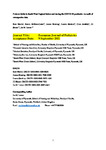Preterm births in South-West England before and during the COVID-19 pandemic: An audit of retrospective data
| dc.contributor.author | Maslin, Kate | |
| dc.contributor.author | McKeon-Carter, R | |
| dc.contributor.author | Hosking, Joanne | |
| dc.contributor.author | Stockley, Lauren | |
| dc.contributor.author | Southby, C | |
| dc.contributor.author | SHAWE, JILL | |
| dc.contributor.author | Latour, Jos M | |
| dc.date.accessioned | 2021-09-09T09:20:23Z | |
| dc.date.issued | 2021-09-17 | |
| dc.identifier.issn | 0340-6199 | |
| dc.identifier.issn | 1432-1076 | |
| dc.identifier.uri | http://hdl.handle.net/10026.1/17775 | |
| dc.description.abstract |
The COVID-19 lockdown had a series of intended and unintended consequences, including reduced infections and changes in activities and behaviours. Some of these changes may have been beneficial to perinatal outcomes; however, other factors such as reduced access to face-to-face healthcare may have contributed negatively to antenatal care. The aim of this audit was to evaluate neonatal admissions in the South-West of England during the COVID-19 pandemic in 2020 and the previous two years 2018-2019. Anonymised birth and neonatal admission rates from January to December 2020 was obtained and compared to data from 2018 to 2019. The results demonstrate a decreasing in neonatal unit admissions between 2018 and 2020, 9.48% of live births in 2018 (95% CI 9.17, 9.80) to 8.89% (95% CI 8.65, 9.13) in 2020 (p = 0.002).Conclusion: There were no significant differences across gestational groups. It is unclear without nationwide data whether our observed trends, decreased neonatal admissions over the past 3 years, are generalisable and related to the COVID-19 pandemic. Future research exploring the impact of lockdowns on behaviour change during pregnancy and support services is warranted to understand the implications of pandemics on pregnancy and preterm birth. What is Known: • The COVID-19 lockdown had a series of intended and unintended consequences; some of which may have been beneficial to perinatal outcomes. • Research suggests that preterm births have not significantly changed overall, but they have decreased in high-income countries. What is New: • In our audit, analysing retrospective data of regional birth and neonatal admission from the South-West of England, we observed a decrease in live birth rates between 2018 and 2020. • A reduction in neonatal unit admissions was observed from 2018 to 2020 with no significant differences across gestational groups. The reduction from 2019 to 2020 was smaller than that from 2018 to 2019 implying that the COVID-19 pandemic in 2020 was not necessarily implicated. | |
| dc.format.extent | 859-863 | |
| dc.format.medium | Print-Electronic | |
| dc.language | en | |
| dc.language.iso | en | |
| dc.publisher | Springer (part of Springer Nature) | |
| dc.subject | Birth | |
| dc.subject | COVID-19 | |
| dc.subject | Neonatal intensive care units | |
| dc.subject | Neonatology | |
| dc.subject | Patient admissions | |
| dc.title | Preterm births in South-West England before and during the COVID-19 pandemic: An audit of retrospective data | |
| dc.type | journal-article | |
| dc.type | Journal Article | |
| plymouth.author-url | https://www.webofscience.com/api/gateway?GWVersion=2&SrcApp=PARTNER_APP&SrcAuth=LinksAMR&KeyUT=WOS:000696760600002&DestLinkType=FullRecord&DestApp=ALL_WOS&UsrCustomerID=11bb513d99f797142bcfeffcc58ea008 | |
| plymouth.issue | 2 | |
| plymouth.volume | 181 | |
| plymouth.publication-status | Published | |
| plymouth.journal | European Journal of Pediatrics | |
| dc.identifier.doi | 10.1007/s00431-021-04265-y | |
| plymouth.organisational-group | /Plymouth | |
| plymouth.organisational-group | /Plymouth/Faculty of Health | |
| plymouth.organisational-group | /Plymouth/Faculty of Health/Peninsula Medical School | |
| plymouth.organisational-group | /Plymouth/Faculty of Health/School of Nursing and Midwifery | |
| plymouth.organisational-group | /Plymouth/REF 2021 Researchers by UoA | |
| plymouth.organisational-group | /Plymouth/REF 2021 Researchers by UoA/UoA03 Allied Health Professions, Dentistry, Nursing and Pharmacy | |
| plymouth.organisational-group | /Plymouth/Research Groups | |
| plymouth.organisational-group | /Plymouth/Research Groups/Institute of Health and Community | |
| plymouth.organisational-group | /Plymouth/Research Groups/Institute of Translational and Stratified Medicine (ITSMED) | |
| plymouth.organisational-group | /Plymouth/Research Groups/Institute of Translational and Stratified Medicine (ITSMED)/CBBB | |
| plymouth.organisational-group | /Plymouth/Research Groups/Plymouth Institute of Health and Care Research (PIHR) | |
| plymouth.organisational-group | /Plymouth/Users by role | |
| plymouth.organisational-group | /Plymouth/Users by role/Academics | |
| plymouth.organisational-group | /Plymouth/Users by role/Researchers in ResearchFish submission | |
| dc.publisher.place | Germany | |
| dcterms.dateAccepted | 2021-09-09 | |
| dc.rights.embargodate | 2022-9-17 | |
| dc.identifier.eissn | 1432-1076 | |
| dc.rights.embargoperiod | Not known | |
| rioxxterms.funder | National Institute for Health Research | |
| rioxxterms.identifier.project | NIHR Pre-doctoral Fellowship | |
| rioxxterms.versionofrecord | 10.1007/s00431-021-04265-y | |
| rioxxterms.licenseref.uri | http://www.rioxx.net/licenses/all-rights-reserved | |
| rioxxterms.licenseref.startdate | 2021-09-17 | |
| rioxxterms.type | Journal Article/Review | |
| plymouth.funder | NIHR Pre-doctoral Fellowship::National Institute for Health Research |


